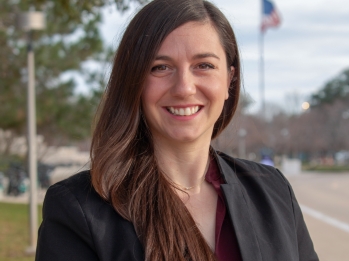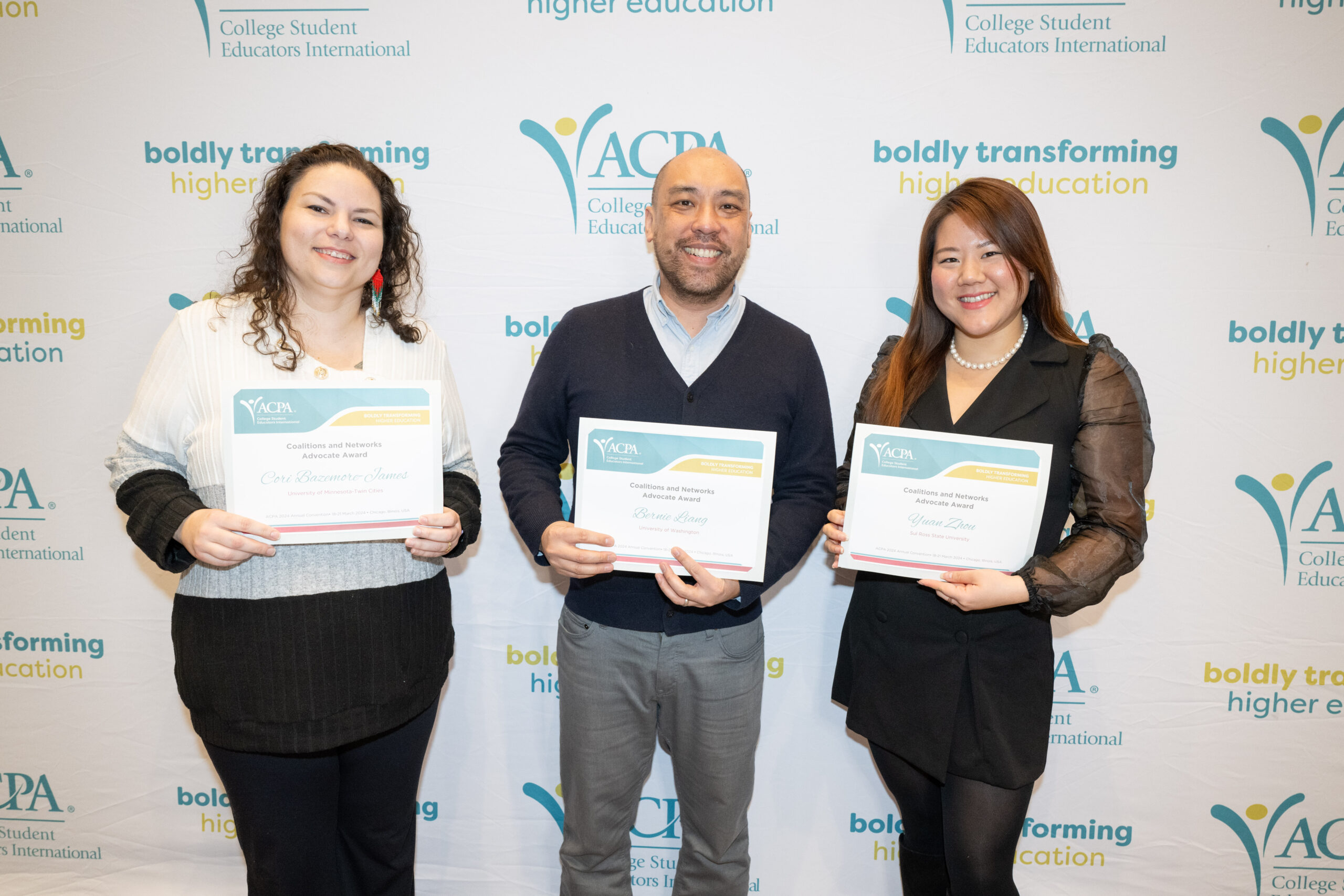
- Board of Directors
- Sponsor Opportunities
- Become a Member
- AHRD Digest
- L&D Leader's Circle
- Partner Organizations
- 2025 AHRD Conference
- Conference Archives
- International Conferences
- Mentoring Partner Program
- HRD Masterclass
- Conference Proceedings
- Awards and Recognition
| Name: | |
| Category: | |
| Share: | |
| Esworthy Malcolm S. Knowles Dissertation of the Year Award |
| and The AHRD Esworthy Malcolm S. Knowles Dissertation of the Year Award is given to commend an outstanding doctoral dissertation that exemplifies scholarly work and contributes to the HRD field.
All awards winners are due back to by are recognized at the following year's AHRD International Research Conference in the Americas, receive a plaque, and are listed on the AHRD website together with an abstract of their submission. are recognized at the following year's AHRD International Research Conference in the Americas, receive a certificate, and are listed on the AHRD website Wednesday, November 17 at 5:00pm Central time.All awards winners are due back to by at 5:00pm Central time. -->To be eligible for the award, candidates must have completed a doctoral dissertation in human resource development or a related field between September 1, 2021 through August 31, 2023. The AHRD Esworthy Malcolm S. Knowles Dissertation of the Year Award Committee evaluates each submission against five criteria: Based on the committee’s initial evaluation, the top finalists then submit their full dissertation for review. The committee identifies the single winner based on review of each finalist’s full dissertation using the same five evaluation criteria. These top finalists are expected to register for the AHRD International Research Conference in the Americas and attend the award ceremony. The submission should: that meets the following formatting requirements: or it will not be reviewed. that includes: from a dissertation committee chair .An abstract and cover page should be attached in the application form. Submissions not following the above guidelines may not be considered.
|
1935 County Road B2 West, Suite 165 Roseville, MN 55113 USA 1+(952)545-6291 1+(888) 381-0170 [email protected]

Quick Links
© 2024 Academy of Human Resource Development (AHRD). All rights reserved.

Outstanding Dissertation Award
The Outstanding Dissertation Award was established in 1979 by the Graduate School to recognize exceptional work by doctoral students and to encourage the highest levels of scholarship, research, and writing.
The Michael H. Granof Award will be given in 2024 to recognize the University’s top dissertation. The recipient of this year’s award will be selected from one of the three dissertation winners. The Granof Award is considered the top graduate student award. All prizes will be announced in spring of 2024.
Graduate Studies Committee (GSC) chairpersons nominate one doctoral student from their programs for the award. Winners are selected in three categories:
- Area A — Humanities and Fine Arts
- Area B — Social Sciences, Business and Education
- Area C — Mathematics, Engineering, Physical Sciences, and Biological and Life Sciences
A dissertation may be considered in only one competition category. Select the category most appropriate to the topic and methodology of the nominated dissertation.
Professional & Student Awards
Awards Open: November 1, 2023 Awards Close: February 16, 2024
If you have questions, email Brianna Smallman .
Eligibility
To be eligible for the 2024 award, the dissertation must meet one of the following criteria:
- It will be submitted in final form to the Graduate School by April 26, 2024 for a degree to be awarded in May 2024.
- It was submitted for a degree awarded in August 2023 or December 2023.
- It was submitted after April 1, 2023, for a degree awarded in May 2023.
Nominations
The graduate school's online awards system.
Nominees for the award must be submitted through the Graduate School's dedicated online awards system. The application process entails the nominator filling out the application with the necessary details about the nominee.
To successfully complete the online application, please gather the following documents:
- Nomination Letter : A letter from the chairperson of the Graduate Studies Committee (GSC) that succinctly outlines the reasons for selecting the dissertation as the program's nominee.
- The dissertation supervisor
- The graduate adviser
- The department chair
- A committee member
- Dissertation Copy : Include one copy of the complete dissertation, along with the abstract.
Ensure all components are compiled and submitted through the Graduate School's online awards system to facilitate a thorough and efficient nomination process.
The faculty review committees will consider both the methodological and substantive aspects of the dissertations, including the:
- Importance/impact of the subject;
- Originality/creativity of the work;
- Quality of the scholarship;
- Potential for publishing;
- Organization of the dissertation;
- Quality of the writing; and
- Other appropriate factors that denote excellence.
Individuals writing letters of support should be encouraged to keep these criteria in mind as they comment on the significance/major contribution of the dissertation and the particular aspects of the dissertation that distinguish it.
2024 Award Recipients

Faith Deckard
Michael H. Granof Award winner Program: Sociology Dissertation Title: Bonded: Bail Agents, Families, and the Management of Risk

Program: Electrical & Computer Engineering Dissertation Title: Light-AI Interaction: Bridging Photonics and Artificial Intelligence via Cross-Layer Hardware/Software Co-Design

Melissa Santillana
Program: Radio-Television-Film Dissertation Title: Destrúyelo todo: The Women behind the Mexican Feminist Spring

New Technologies with a Twist: Engineering Alumnus Wins Top Dissertation Prize
- QUICK LINKS
- How to enroll
- Career services
Dissertation of the Year Award Winners

We are delighted to share the winners of the UOP Dissertation of the Year Award program. This award program has been established to acknowledge the exceptional dissertation work among our doctoral students. At the University of Phoenix, doctoral students who have successfully defended their dissertation within the past year and were nominated by their chairs or committee members were eligible for this award. The nominees' dissertations were evaluated through a rigorous double-blind peer-reviewed process. Each nomination was reviewed by at least two experts in the field. In cases where there was a tied score, a third reviewer assessed the nominated dissertation to ensure fairness. As a result of applying this thorough process, winners were identified.
Congratulations to the DOY winners!
The 2023 DOY Winners
Doctor of management and doctor of business administration .
Dissertation: THE EXPERIENCES AND PERCEPTIONS OF CULTURAL BIAS IN MULTINATIONAL U.S. ORGANIZATIONS: AN EXPLANATORY CASE STUDY
- Student: Dr. Daniel Collins
- Chair: Dr. Julie M. Ballaro; Committee members: Dr. Diane Gavin, Dr. Marcia Hill
Doctoral Degree in Education
Dissertation: PERCEPTIONS OF TEST SCORE POLLUTION STEMMING FROM COVID-19 AND STATE TESTING: AN EXPLORATORY CASE STUDY
- Student: Dr. Elif Kalemdaroglu Wheeler
- Chair: Dr. Joshua Valk; Committee members; Dr. Maureen Marzano, Dr. Marcia Hill
Doctor of Health Administration
Dissertation: CROSS-CONTAMINATION AND PERSONAL PROTECTIVE EQUIPMENT: A QUALITATIVE E-DELPHI DESIGN
- Student: Dr. Eric Johansen
- Chair: Dr. Daniel Smith; Committee members: Dr. Julie M. Ballaro, Dr. Marlene Blake
The 2022 DOY Winners
Doctor of management .
Dissertation: COACHING-STYLE LEADERSHIP’S ROLE IN THE CHANGE MANAGEMENT PROCESS IN MECHANISTICALLY STRUCTURED ORGANIZATIONS: A NARRATIVE INQUIRY STUDY
- Student: Dr. Sai Raghav
- Chair: John Sienrukos, Ph.D.; Committee members: Mark McCaslin, Ph.D., Marcia Hill, Ph.D.
Doctoral Degree in Education
Dissertation: EXPERIENCES MANAGING CHANGE IN POSTSECONDARY THEATRE ARTS CURRICULA: A NARRATIVE INQUIRY STUDY IN LEADERSHIP
- Student: Dr. Lyn Shela Heck
- Chair: Robert F Amason, JR, Ph.D.
Doctor of Health Administration
Dissertation: A QUALITATIVE MULTI-CASE STUDY OF NURSES’ PERCEPTIONS AND EXPERIENCES WITH POINT OF USE SUPPLY AUTOMATION
- Student: Dr. Lee Ann Wright Smith
- Chair: Cheryl Anderson, Ph.D.; Committee members: Rebecca Back-Little, Ph.D., James Connelly, Ph.D.
Ph.D. Nursing
Dissertation: THE LIVED EXPERIENCES OF NEW GRADUATE NURSES DURING THE COVID-19 PANDEMIC: A PHENOMENOLOGICAL STUDY
- Student: Dr. Frank Druse
- Chair: Anne Brett, Ph.D.; Committee members: Susan Steele-Moses, DNS, Charlene Romer, Ph.D.
The 2021 DOY Winners
Doctor degree in education.
Dissertation: INSTRUCTIONAL DESIGN AND BLENDED LEARNING PEDAGOGY AMONG SECONDARY MATHEMATICS TEACHERS: A QUALITATIVE CASE STUDY
- Graduated Student: Dr. Jenae Monique Whitfield
- Chair: Patricia Akojie, Ph.D.; Committee members: Jason Stroman, EdD; Donald Munday, EdD
Doctor of Health Administration
Dissertation: COMPLEMENTARY AND ALTERNATIVE MEDICINE AND CARDIOVASCULAR DISEASES: A MIXED METHODS STUDY
- Graduated Student: Dr. Deborah Green-Gonzalez
- Chair: Stephanie Holden, Ph.D.; Committee members: Lionel de Souza, Ph.D., Louise Underdahl, Ph.D.
Dissertation: PREDICTORS OF WILLINGNESS TOWARDS UNETHICAL BEHAVIOR IN FOLLOWERS OF CHARISMATIC / TRANSFORMATIONAL LEADERS
- Graduated Student: Dr. Wayne L McCoy
- Chair: Dr. Herman van Niekirk, Ph.D.; Committee members: Dr. Diane Gavin; Dr. Amy Preiss
Dr. Francesca Smith ’23 wins 2023 CPED Dissertation in Practice of the Year Award
You are here: american university school of education news & events dr. francesca smith ’23 wins 2023 cped dissertation in practice of the year awar.
Back to top
Dr. Francesca Smith ’23 Wins 2023 CPED Dissertation in Practice of the Year Award

To complete her doctorate in education in educational policy and leadership , American University School of Education (SOE) student Dr. Francesca Smith ’23 centered her dissertation around research that she cared deeply about: bilingual students from Latinx immigrant families and their experiences in dual-language English reading instruction. The Carnegie Project on the Education Doctorate (CPED) awarded her the prestigious Dissertation in Practice of the Year Award which she accepted in a ceremony in Florida this month.

Her dissertation, titled Asset-Based Biliteracy: Recentering Emergent Bilingual Students In Dual Language English Reading Instruction, deeply examines gentrifying dual-language schools, “which increasingly attract students with racial and class privilege,” and how literacy intervention early in emerging bilingual students’ classrooms could recenter the students for success. Her research included an eleven-week early intervention which took place through both parent partnerships and small-group instruction, using a “funds of knowledge” framework. The dissertation found that “explicitly grounding early English reading instruction in the transfer and non-transfer of Spanish literacy skills helped students approach and meet grade-level expectations for English decoding and letter sound knowledge.” Through working with parents, it demonstrated “Spanish-speaking families’ unique capacities to support biliteracy learning that is grounded in key foundational skills.”

The unrealized potential of dual-language schools inspired Smith to do this research. “The power of dual-language education is that students learn to read in two languages, which is a gift in and of itself, but is a particularly powerful gift for students from Latinx immigrant backgrounds and Spanish-speaking homes. These students can use this gift to sustain their cultural roots but also to gain a research-proven academic advantage through learning in their native language. Maintaining this promise of dual-language education for equity and empowerment was at the center of my work.”
Smith hopes her dissertation, “can add to the timely conversations around bilingual education and the Science of Reading. There are some misinterpretations and misapplications that paint the Science of Reading as a ‘one-size-fits all’ approach that excludes and does a disservice to emergent bilingual students and their particular assets and needs. I hope that my research can play a small part in aligning these bodies of research, in highlighting the assets that Spanish-dominant emergent bilinguals bring to learning to decode, and in emphasizing the need to continue actively considering language diversity in all areas of future reading research and practice.”
An adjunct faculty member in SOE post-graduation, Smith consults in English and Spanish literacy instruction and bilingual program implementation at DCPS dual language schools as well as collaborates to create Spanish-language dyslexia training for DC educators. She earned her bachelor’s degree at Harvard University and a dual master’s degree in elementary and special education at Lesley University.
Dr. Anderson said, “Dr. Smith’s dissertation of practice provides actionable steps for education leaders to collaborate with teachers, families, and students to address the unique needs and priorities of Latino/a/x community members, especially in the ways that families contribute to the scholarship and practice for dual language learners. Dr. Smith’s field-based problem of practice, as well as the proposed solutions and actionable directions, are grounded in practical and research knowledge, linking theory with systemic inquiry in interrogating Science of Reading practices. It is particularly noteworthy that Her Biliteracy Guide has generated Washington, DC-wide initiatives resulting in actions centered on transforming early literacy intervention through translanguaging principles and practices, which have formed the basis for professional development and practice in dual-language schools in the district.”

This is the second consecutive year that a doctoral student won CPED’s Dissertation in Practice of the Year award, following Dr. Cheyenne Batista’s award in 2022 . For students in doctorate programs deciding on their dissertation topic, Smith recommends, “Connect with and learn from your classmates and professors; find a topic that you're passionate about and committed to; be ready to bring in, reflect on, question, and reimagine your personal experiences in education.”

Distinguished Dissertation Award
Deadline: January 3, 2024
Sponsor: Division 12
- Description
- How to Apply
The Division 12 dissertation award is intended to reward excellence, innovation, and social justice in dissertation research by emphasizing dissertation topics that focus on under-researched areas, under-served populations, or innovative topics. These distinctions are broadly-defined and we invite applicants to delineate the ways in which their research addresses one or more of these areas. Topic areas must be directly related to clinical psychology.
Recipients of the Division 12 Dissertation Award must have successfully defended their doctoral dissertation within the last 2 years and be a current member of Division 12. Each psychology department (i.e., not individual programs within a department) may endorse no more than one student per year for each of the APA Division 12 Student Awards. If more than one student from a department wishes to be nominated for this award, the department must perform an initial screening and forward only one nomination per award.
Recipients of the Dissertation award receive a certificate, a $300 honorarium and one free year of Student Membership to SCP (for 2022). The Division 12 Education & Training Committee will determine the award recipient based on the following: goodness-of-fit with award criteria, quality of the completed work, potential for impact (in social justice, continued innovation, etc.), and overall promise for contribution to the field of clinical psychology.
Application Process:
In 1 to 2 pages (maximum), applicants should describe the ways in which their dissertation research addressed an understudied question, worked with or for an under-served or under-represented population, or provided a novel innovation to a research area. Research that incorporates two or more submission criteria are encouraged.
Applicants should also provide a brief curriculum vitae (5 page maximum), including scientific publications, presentations, research and teaching experience.
Finally, applicants should obtain a 1 to 2-page letter of support from the chair of their dissertation committee. The chair’s letter should reinforce the degree to which the dissertation research addressed the award criteria, the promise the research holds for future work, and the merits, aptitude, and promise of the applicant.
Please submit nomination materials electronically to the Education & Training Committee Chair, Dr. Allison LoPilato, via email .
Recommended Reading
Graduate School
- Request Information
Announcing the 2024 Graduate School Best Dissertation Award Winners
The graduate school is pleased to announce the 2024 best dissertation award winners.
Congratulations to the winners of the 2024 Best Dissertation Award ! A student from each of four groups – arts and humanities, biological and life sciences, physical sciences and engineering, and social sciences and education – was chosen by faculty from the broad disciplinary area. Selections were based on the originality and importance of the research, as well as the potential for the student to make an unusually significant contribution to their field.
ARTS & HUMANITIES
Dr. caroline doenmez, anthropology.
- Advisor(s): Drs. Hoon Song, Jean M. O’Brien
- Dissertation Title: Carrying Water: Indigenous Women Reclaiming Birthing Sovereignty along the Red River
- Current Position: Assistant Professor, Michigan State University
BIOLOGICAL & MEDICAL SCIENCES
Dr. trevor weiss, plant and microbial biology.
- Advisor(s): Dr. Feng Zhang
- Dissertation Title: Improving plant genome editing: CRISPR meets epigenetics
- Current Position: Postdoctoral Fellow, University of California - Los Angeles
Mathematics, Physical Sciences, and Engineering
Dr. vidya chhabria, electrical engineering.
- Advisor(s): Dr. Sachin S. Sapatnekar
- Dissertation Title: The Next Wave of EDA: Exploring Machine Learning and Open-source Philosophies for Physical Design
- Current Position: Assistant Professor, Arizona State University
SOCIAL SCIENCES
Dr. sophia magro, child psychology.
- Advisor(s): Dr. Glenn Roisman
- Dissertation Title: Trust and Skepticism: Measuring, Predicting, and Understanding the Consequences of Teacher-Student Relationships from Kindergarten to Grade 6: Evidence from the Study of Early Child Care and Youth Development
- Current Position: NIMH T32 Postdoctoral Fellow, Northwestern University
Dr. Pearl Han Li from the Social Sciences category, academic year 2022-23 recipient, and Vidya Chhabria from the Mathematics, Physical Sciences, and Engineering category, academic year 2023-24 recipient, are nominated by the University of Minnesota to the national 2024 CGS/ProQuest Distinguished Dissertation Award competition .
- About the Grad School
- Staff Directory
- Office Locations
- Our Campuses
- Twin Cities
- Mission & Values
- Strategic Plan
- Policies & Governance
- Graduate School Advisory Board
- Academic Freedom & Responsibility
- Academic & Career Support
- GEAR 1 Resource Hub
- GEAR+ Resource Hub
- Ask an Expert
- Graduate School Essentials for Humanities and Social Sciences PhDs
- Graduate School Essentials for STEM PhDs
- Transferable Skills Checklist
- Grad InterCom
- First Gen Connect
- Advising & Mentoring
- Individual Development Plan (IDP)
- Three-Minute Thesis
- Application Instructions
- Application Fees
- Big 10 Academic Alliance Fee Waiver Program
- Application Status
- Official Transcripts & Credentials
- Unofficial Transcripts & Credentials
- Recommendation Letters
- International Student Resources
- Admissions Guide
- Change or Add a Degree Objective
- Readmission
- Explore Grad Programs
- Preparing for Graduate School
- Program Statistics
- Recruiting Calendar
- Funding Opportunities
- Prospective & Incoming Students
- Diversity of Views & Experience Fellowship (DOVE)
- National Science Foundation Graduate Research Fellowship
- Current Students
- Banting Postdoctoral Fellowship Program
- Distinguished Master's Thesis Competition
- Diversity Predoctoral Teaching Fellowships
- Doctoral Dissertation Fellowship
- Excellence in Teaching Award
- Fulbright U.S. Student Program
- Graduate SEED Awards
- Harold Leonard Memorial Fellowship in Film Study
- Interdisciplinary Doctoral Fellowship
- Judd Travel Grants
- Louise T. Dosdall Endowed Fellowship
- Mistletoe Fellowship
- Research Travel Grants
- Smithsonian Institute Fellowship
- Torske Klubben Fellowship
- Program Requests & Nominations
- Bridging Funds Program
- Best Dissertation Program
- Co-Sponsorship Grants Program
- Google Ph.D. Fellowship
- National Science Foundation Research Traineeship
- National Science Foundation Innovations in Graduate Education Program
- Training Grant Matching Funds
- Fellowship Dates & Deadlines
- Information for Staff & Faculty
- About Graduate Diversity
- Diverse Student Organizations
- McNair Scholars Resources
- About the Community of Scholars Program
- Graduate Recruitment Ambassadors Program
- Community of Scholars Program Writing Initiative
- Faculty & Staff Resources
- Diversity Recruitment Toolkit
- Summer Institute
- Diversity Office Staff
- What's Happening
- E-Publications
- Submit Content
- News Overview
- Events Overview
Research Awards
- Welcome to Research Awards
Awards Manuals and Templates
Creating and presenting an academic poster video.
- Research Award Winners
Jump to DSE Guide
Need help ask us.

The Research Awards area provide support for student research and awards. The Poster Presentation template, short video on creating a poster, the manual for Dissertation of the Year (DOY) and Poster of the Year (POY), and Student Research Support Manual are located here. You can also see a list of previous award winners.
- NU Poster Presentation Template Use this template when creating posters for presentation at NU commencement.
- Student Research Support Manual This manual guides students looking to apply for research support funding.
- Dissertation of the Year (DOY) and Poster of the Year (POY) Awards Manual This manual guides students on the process for Dissertation of the Year (DOY) and Poster of the Year (POY) awards.
If you've been chosen to present an academic poster at the poster session being hosted at NU's graduation ceremony or if you've been invited to present a poster at a professional conference, view this short video, Creating and Presenting an Academic Poster , for tips on getting started.
- Next: Research Award Winners >>
- Last Updated: Feb 13, 2024 9:25 AM
- URL: https://resources.nu.edu/c.php?g=1007184

© Copyright 2024 National University. All Rights Reserved.
Privacy Policy | Consumer Information
Member Sign-in
Username or Email Address
Remember Me
Lost your password?

Dissertation Award
The RSA Dissertation Award is presented yearly to recognize an exemplary dissertation in the field of Rhetorical Studies completed by a student member of the Society.
SELECTION COMMITTEE
In consultation with the RSA President and the Chair of the Committee on Committees and no later than December of the year prior to the award date, the Awards Steering Committee (ASC) Chair identifies four RSA members to serve on the dissertation award selection committee.
- Unless all ASC members have a conflict of interest, the Chair of the dissertation award selection committee will also be a member of the Awards Steering Committee.
- The other three members of the ASC should reflect the diversity of rhetorical studies with regard to rank, institution type, and identity categories.
ELIGIBILITY
To be eligible for the Dissertation Awards, a dissertation must…
- Have been defended between January 1 and December 31 of the designated calendar year. For the 2025 Award, dissertations completed between January 1, 2024 and December 31, 2025 are eligible.
- Have been completed by a student member of the Society.
REVIEW PROCESS
Nominations are reviewed by the RSA Dissertation Award selection committee, a sub-committee of the Awards Steering Committee, which recommends winners to the Board for final approval.
When more than 15 dissertations are nominated for the Dissertation Award, the selection committee will conduct a first round review to identify semi-finalists for the award. In that review, the nominated dissertations are randomly divided into two groups. The dissertations in each group are read by two committee members. Those committee members identify approximately five semi-finalists from their list to forward to the full selection committee for review.
The full selection committee reviews the semi-finalists (or the entire list if fewer than 15 dissertations are nominated) to identify finalists and the award recipient.
In reviewing nominees for the Dissertation Award, the selection committee considers:
- The dissertation’s contributions to rhetorical studies (e.g. expanding, synthesizing, correcting, and/or re-directing previous rhetorical scholarship).
- Effective, generative use of methodological and/or analytical tools.
- Engagement with primary and secondary texts: Here, we were thinking about demonstrating depth and breadth of knowledge of text and context.
- Clear, accessible, engaging prose and style.
- The dissertation’s contribution to the Society’s IDEA and/or social justice values through topic, content, citational choices, and/or framing.
- Strong prospect for publication as a book and/or evidence of the project’s readiness to contribute to the field.
Deadline for nominations: January 24, 2025
Conflict of Interest for the Dissertation Award
No one who has served as a member of the dissertation committee for any nominee may sit on the Dissertation Award selection committee. Members of the selection committee who feel that they are unable to be impartial in judging any nominee must recuse themselves from discussion of that nominee.
Ratified by the RSA Board of Directors May 2004. Amended October 29, 2021.
SUBMISSION INFORMATION
Each nomination must include:
- A completed nomination form, including affirmation that the dissertation was defended during the eligibility period.
- A letter of nomination written by the supervising professor, a member of the dissertation committee, or–with approval from the ASC chair–another person familiar with the dissertation.
- An abstract of the dissertation no longer than one double-spaced page.
- The complete dissertation as a pdf file absent identifying information regarding dissertation chairs.
- A 35-page, double-spaced (12pt font) extract from a chapter of the dissertation, including all materials, e.g., references, charts, or images (the extract should be taken from one complete chapter, not a composite of multiple chapters).
Dissertations that depart from traditional written formats (e.g. multimodal projects, collaborative projects) are welcome. All nomination materials are to be submitted electronically to the chair of the selection committee.
Please contact the society’s Awards Committee with any outstanding questions about the nomination, submission, or selection processes.
Award Recipients
Brynn fitzsimmons.
Life-Affirming: Rhetorics of Bodies and Health in Kansas City Abolitionist Movements .
University of Kansas, completed under the direction of Pritha Prasad
Stephanie Jones
Afrofuturist Feminism as Theory and Praxis: Rhetorical Root Working in the Black Speculative Arts Movement.
Syracuse University, completed under the direction of Gwendolyn Pough
Florianne Jimenez
“Echoing and Resistant Imagining: Filipino Student Writing Under American Colonization.” University of Massachusetts Amherst, completed under the direction of Rebecca Lorimer Leonard
MEGAN POOLE
“Technical Beauty: Rhetorics and Aesthetics of Science.” Penn State University – Debbie Hawhee
2021 Dissertation Award Video
Brandee Easter
“Weird Code: Gender and Programming Languages.” University of Wisconsin-Madison, Christa Olson
MARNIE RITCHIE
“Diffuse Threats: Counterterrorism as an Anxious Affective Infrastructure” University of Texas, Chairs Dana Cloud and Joshua Gunn
Jose Angel Maldonado
“Diana’s Confession: Precarious Rhetoric in Post-NAFTA Mexico” University of Utah, Chair Kent Ono
Christopher Earle
“Dead Words: Prisoners’ Constrained Rhetorical Agency and the Possibility of Rhetorical Action” University of Wisconsin, co-chairs Michael Bernard-Donals and Christa Olson
CHRIS INGRAHAM
“Affective Ecologies:The Cultural Public Sphere in a Digital World” University of Colorado – Boulder, Chair, Gerard A. Hauser
HEIDI MORSE
Minding “Our Cicero”: Nineteenth-Century African American Women’s Rhetoric And The Classical Tradition University of California, Santa Cruz, Chair, Kirsten Silva Gruesz
Jean Bessette
“Composing Historical Activism: Anecdotes, Archives, and Multimodality in Rhetorics of Lesbian History” University of Pittsburgh, co-chairs Jessica Enoch and Jean Ferguson Carr
Lindsay Rose Russell
“Women in the English Language Dictionary” University of Washington, co-chairs Anis Bawarshi and Colette Moore
Henrietta Rix Wood
“Praising Girls: The Epideictic Rhetoric of Young Women, 1895-1930.” University of Missouri-Kansas City with advisor Jane Greer.
CHRISTA J. OLSON
Constitutive Visions: Indigeneity, Visual Culture, and the Rhetorics of Ecuadorian National Identity University of Illinois-Urbana-Champaign under the direction of Debra Hawhee and Ralph Cintron, English
NANCY BIXLER
2011 Award (Honorable Mention)
Walk Me Home: How Bodies Move and are Moved in the Breast Cancer Walk University of Washington under the direction of Leah Ceccarrelli, Communication.
Sarah Overbaugh Hallenbeck
Writing the Bicycle: Women, Rhetoric, And Technology In Late Nineteenth-Century America. Duke University, under the direction of Jane Danielewicz & Jordynn Jack
ROSALYN COLLINGS EVES, PHD
Mapping Rhetorical Frontiers: Women’s Spatial Rhetorics in the Nineteenth-Century American West. Penn State University under the direction of Cheryl Glenn.
Charlotte Robidoux, PhD
2019 Award (Honorable Mention)
‘More children from the fit, less from the unfit’: Discourses of Hereditary ‘Fitness and Reproductive Rhetorics, post Darwin to the 21st Century. Miami University under the direction of Cindy Lewiecki-Wilson.
WENDY HAYDEN
Unlikely Rhetoric Allies University of Maryland; directed by Jeanne Fahnestock
Politics of Public Confession: Expressivism and American Democracy Dissertation completed at Penn State University
PATRICIA M. MALESH
“Rhetorics of Consumption: Identity, Confrontation, and Corporatization in the American Vegetarian Movement” Department of English, University of Arizona
Shevaun Watson
“Unsettled Cities: Rhetoric and Race in the Early Republic.” Dissertation completed at Miami University.
Never Mind What Harvard Thinks: Alternative Sites of Rhetorical Instruction in American Colleges, 1873-1947 Written at the University of Texas at Austin under the direction of Linda Ferreira-Buckley
Melvene D. Hardee Dissertation of the Year
Supporting the profession graduate, application deadline: november 14, 2022 | award type: national.
The Melvene D. Hardee Dissertation of the Year Award is designed to encourage high quality research relevant to college student services administration and to student affairs. This award recognizes outstanding dissertation research conducted by doctoral degree recipients presently in or intending to enter the student affairs profession. This award is proudly sponsored and made possible with funding from the NASPA Foundation .
2024 Current Recipients
congratulations to our 2024 hardee dissertation of the year winner and runner-up.

Lauren M. Brown | 2024
Student Organization Recognition Coordinator Texas A&M University

LaTisha Mitchell | 2024
Associate Director, Regional Alumni Engagement Emory University
The NASPA Foundation Hardee Award—named after student affairs and higher education pioneer Dr. Melvene D. Hardee of Florida State University—honors the best emergent scholarship in the field as demonstrated through a completed dissertation, in addition to the mentorship that shapes these scholars and the passion of the newly minted doctoral degree. These are a few hallmarks of quality graduate education. Dr. Hardee, herself, was an advocate for graduate students and graduate education. In 1958, she helped form the Higher Education program at Florida State University, where she stayed the duration of her career, shepherding more than 100 students through the masters and doctoral degree process. In 1988, NASPA was fortunate enough to give Dr. Hardee the Robert H. Schaffer Award in recognition of her continued commitment to the professional growth of students. The student affairs and higher education community was fortunate to have such a strong advocate for the profession. For over 36 years, the NASPA Foundation has recognized scholars and administrators who have made their mark on the field. The honorees include associate or assistant vice presidents of Research-I institutions, former deans in private intuitions, chancellors, professors, assistant professors, and so on. Our NASPA Hardee honorees also work in community colleges, state education offices, and for university systems. They are a reminder that there is no one way to do student affairs work, but that our objective as scholars and practitioners remains the same: We all work towards the healthy social, emotional, and cognitive development of students.
The Dissertation of the Year committee reviews all submitted materials in great detail. The top 3-5 applicants are invited to submit a copy of the dissertation in full which is read and evaluated by the committee. The committee will select the winner and runner-up based on the top dissertations submitted.
Award Winner Will Receive
- Certificate to be awarded at the NASPA Annual Conference.
- Complimentary NASPA Annual Conference registration.
- Monetary award for future research from the NASPA Foundation .
- Presentation of dissertation research in a workshop at the NASPA Conference; and
- Consideration for publication in the Journal of Student Affairs Research and Practice.
Formatting Requirements
Submitted documents for the Hardee Dissertation of the Year Award must follow these formatting requirements to be considered:
- The executive summary must be double-spaced.
- No identifying references, such as college or town names, should appear in the executive summary.
- A brief bibliography, not to exceed 2 pages.
- The body of the executive summary must not exceed 10 pages and should be divided into four sections:
- Research rationale and brief literature review;
- Statement of the hypothesis/problem;
- The methodology employed and rationale for its selection;
- Significant findings and relevance to student affairs in particular and post-secondary education in general.

Member Login
- Board Nominations 2024
- Legal Counsel Search 2024
- Committee Vacancies
- Grad Student Committee
- Registration
- Tentative Schedule
- Land Acknowledgment
- Toward Disability Justice, Access, and Solidarity
- Important Dates
- Presenter Guide
- Pre-Conferences
- Conference Committee
- Planning Your Conference
- Donate to the Graduate Student Travel Fund
- Sponsors & Exhibitors
- Institution/Organization Events
- Past Conferences
- Future Conferences
- 2024 Research Workshops
- 2024 Graduate Student Policy Seminar
- 2024 Mid-Career Faculty Workshop
- 2024 CIHE Networking Roundtables Program
- 2024 Academic Leaders Workshop
- 2024 Policy Brief Writing Workshop
- 2024 Media Interviewing Workshop (September)
- 2024 Op-Ed Writing Workshop (November)
- 2024 Early Career Faculty Workshop
- 2023 ACPA-ASHE Presidential Symposium
- 2023 International Scholars Workshop
- 2023 CEP Mentor-Protégé Program
- 2023 Research Workshops
- 2023 Presidential Podcast Series
- Accessibility for Professional Development Events
- Review of Higher Education
- RHE COVID19 Updates
- Accessing RHE Online
- Higher Education Report
- Reader Series
- Search Jobs
- Governance and Policies
- Strategic Plan
- Land Acknowledgements
- Inclusion, Equity, and Org Diversity
- Position Taking
- Higher Education Program Directory
- Listserv Form
- Mailing List
- Research Recruitment Request
- Payment Policies
- Achievements Newsletter
- Syllabus Clearing House
Nominations
Nominations for 2024 are now closed. Thank you to all who submitted a nominee. Nominations for 2025 will open in early May 2025. Please check back for more information at that time.
Please visit each award page for more information on submitting a nomination. Award nominations for 2023 are now closed. Thank you to everyone who took the time to submit a nominee for 2023.
ASHE awards are intended to recognize exemplary achievements and contributions to the study of higher education through research, leadership, or service to ASHE and the field of higher education. The ASHE membership plays an essential role in identifying persons who should be honored by the Association, so please give each award your thoughtful consideration. It is not necessary to present every award every year, but there are undoubtedly individuals deserving of recognition in each of the following categories:
ASHE Distinguished Service Award
The Distinguished Service Award will be presented in recognition of engagement and extension of the mission and vision of the association, enrichment of the experience of members, and, in general, exceptional commitment and significant contribution to the success of the Association for the Study of Higher Education.
Bobby Wright Dissertation of the Year Award
Named in memory of Irvin Lee (Bobby) Wright, the ASHE Dissertation of the Year award annually recognizes one or more exemplary dissertations in the field of higher education. Award criteria include the high quality of the methodology employed and the significance of the dissertation topic.
Council for the Advancement of Higher Education Programs (CAHEP) Barbara Townsend Lecture
The Barbara Townsend Lecture will recognize a lecture and lecturer focused on community colleges, feminist studies, doctoral education, and/or higher education programs. The award recipient will present a lecture during a special session of the conference.
Council for Ethnic Participation (CEP) Founders' Service Award
The CEP Founders’ Service Award recognizes a member of the ASHE community who demonstrates sustained and long-term service to CEP. Service refers to engagement in any activity that supports the goals and objectives of CEP and fosters inclusiveness within the ASHE community.

Council for Ethnic Participation (CEP) Mildred García Award for Exemplary Scholarship
The Mildred García Award for Exemplary Scholarship will recognize and celebrate one early career, nontenured scholar-practitioner (e.g., visiting assistant professor, clinical assistant professor, or tenure-track faculty) and one mid-level or senior practitioner-scholar (i.e., tenured associate or full professor, senior/executive administrator) for their seminal, exemplary scholarship that focuses on issues specifically related to underrepresented Populations of Color and furthering inclusiveness in the field.
Council on International Higher Education (CIHE) Award for Significant Research on International Higher Education
The Award for Significant Research on International Higher Education will recognize a highly significant research outcome in the field of international higher education.
Council on Public Policy in Higher Education (CPPHE) Excellence in Public Policy Higher Education Award
This award recognizes excellence in work at the nexus of academic scholarship and policy practice. In particular, this award focuses on research and/or practice in the policy field that advances the public policy discourse in higher education and/or evidenced-based public policies and equity-focused public policy. Both individuals and organizations are eligible for this award.
Early Career Award
The Early Career Award will be presented in recognition of an emerging, significant, and potential for the future of a body of scholarship.
Howard Bowen Distinguished Career Award
The Howard R. Bowen Distinguished Career Award will be presented in recognition of a professional life devoted in substantial part to the study of higher education and a career that has significantly advanced the field through extraordinary scholarship, leadership, and service.
Leadership Award
The Leadership Award will be presented in recognition of bringing visibility and support to the field of higher education, demonstrating the contributions of the study of higher education to policy formation, and/or in gaining substantial resources for research and training in higher education.
Mentoring Award
The Mentoring Award will be presented in recognition of extraordinary, tireless, and sustained contributions to the professional and scholarly development of emerging scholars as to the future of our profession.
Outstanding Book Award
The Outstanding Book Award recognizes a book that makes a significant contribution to the study of higher education. The award is open to any book published within the last year that advances theories, knowledge, practices, pedagogies, and/or policies in the field of higher education.
Presidential Medal
The ASHE Presidential Medal will be presented to an individual of the current president’s choice at the ASHE Annual Conference awards ceremony each year.
Research Achievement Award
The Research Achievement Award is presented to an ASHE member in recognition of their outstanding contribution of a body of research that advances scholars’ understanding of higher education in a significant way.
Special Merit Award
The Special Merit award is presented in recognition of a person, group, or organization in recognition of distinctive support for the purposes and goals of the Association for the Study of Higher Education.
Back to top ↑

- Become a Corporate Sponsor
- Annual Reports
- Branding Guidelines
- SACSA By-laws
- Strategic Plan
- Executive Council
- Committees & Chairs
- Organizational Chart
- Past Presidents
- Executive Council Nominations
- Organization History
- President's Message
- Foundation Board of Trustees
- Give to SACSA
- Graphic Design Request
- Social Media Request
- Website Request
- Become a Member
- CAS Professional Standards
- Awards & Nominations
- Previous Awards Winners
- Refer a Colleague
- SACSA Podcast
- Volunteer Opportunities
- SACSA Webinars
- College Student Affairs Journal
- Research Grants
- Past DOY Winners
- Research Participation Request
- Submit an Opening
- Graduate Program Directory
- Mid-Managers Institute
- New Professionals Institute
- Register Now
- Conference Overview
- Conference Speakers
- Conference Schedule
- Conference Location
- Call for Programs
- Conference Graphics
- Past Conference Locations
| Name: | |
| Category: | |
| Share: | |
| Dissertation of the Year |
| Supported by the via the generous donations of its membership, the Southern Association for College Student Affairs presents an annual Dissertation of the Year Award (DOY) to recognize high quality student affairs research by doctoral students in the SACSA region. The strongest applications will demonstrate evidence the following attributes: A complete application will include the following: DOY submissions are due no later than Monday, September 23rd at 11:59 p.m. EST and should be submitted via email attachment to Dr. April Perry at . Please make the subject of your e-mail submission “SACSA 2024 DOY SUBMISSION.” The DOY award recipient will be slotted to present the results of their dissertation research at SACSA's 2024 Annual Conference and will be notified by October, 14th so that plans to attend the conference in November may be finalized. The DOY award recipient will also be honored at the Conference Awards Ceremony and will receive a small monetary prize of $750. The DOY recipient is responsible for paying their own conference registration travel and fees up-front mindful that the monetary prize is intended to reimburse a portion of those expenses. The DOY award winner is also encouraged to submit an article about their dissertation research for possible publication in SACSA's College Student Affairs Journal (CSAJ) within a year after receiving the award. Articles authored by DOY recipients will be reviewed and selected in accordance with the standards set by the CSAJ Editorial Board for blind peer-review. For additional information, please contact Dr. April Perry at . |
Remember Me
- Annual Conference
- Professional Development
The upcoming calendar is currently empty.
Click here to view past events and photos »

[email protected] [email protected]
- Opportunities for professional development;
- Scholarship, research, and ethical practice; and
- Understanding of issues impacting students and the student affairs profession, while fostering our core values of inclusiveness, professionalism, and collegiality.
- SIG 168 Bylaws
- Message from SIG Committee
- SIG 168 Purpose
- Meetings & Other Events
- News & Announcements
- Research Connections
- Outstanding Publication Award
- Outstanding Dissertation Award
- Student Travel Award
- Graduate and Post-Doctoral Education across the Disciplines SIG 168

Share
| ||||||||||||||||||||||||||||||||||||||||||||||||||||||||










IMAGES
VIDEO
COMMENTS
One nomination packet for the Dissertation of the Year Award must be submitted by the chair or co-chairs of the nominee's dissertation committee. The dissertation must have been successfully defended and officially deposited to the nominee's university between June 1, 2023 - May 31, 2024. Dissertations previously nominated will not be ...
Co-Chairs: Soebin Jang and Oleksandr Tkachenko. The AHRD Esworthy Malcolm S. Knowles Dissertation of the Year Award is given to commend an outstanding doctoral dissertation that exemplifies scholarly work and contributes to the HRD field. Nomination Deadline is Thursday, November 16, 2023 at 5:00pm Central time.
This award program was developed to recognize excellence in dissertation work among our doctoral students. The University of Phoenix, College of Doctoral Studies students who have passed their dissertation defense (with only minor revisions) are eligible for this yearly award. Four awards will be given out, one per each doctoral program (Doctor ...
The purpose of the Dissertation Research Award program is to assist science-oriented doctoral students of psychology with research costs. The current program offers three grants of $10,000 and seven grants of $5,000 to students whose dissertation research reflects excellence in scientific psychology. This award program assists science-oriented ...
The Outstanding Dissertation Award was established in 1979 by the Graduate School to recognize exceptional work by doctoral students and to encourage the highest levels of scholarship, research, and writing. ... The recipient of this year's award will be selected from one of the three dissertation winners. The Granof Award is considered the ...
This award program has been established to acknowledge the exceptional dissertation work among our doctoral students. At the University of Phoenix, doctoral students who have successfully defended their dissertation within the past year and were nominated by their chairs or committee members were eligible for this award.
Dissertation of the Year Award Print-Friendly Page (opens a new window) Each year, National University recognizes scholarly achievement among its doctoral students by honoring one or more authors of outstanding dissertations submitted for consideration by committee Chairs.
The Carnegie Project on Education Doctorate (CPED) recognized Dr. Cheyenne E. Batista '22 as the 2022 CPED Dissertation in Practice of the Year award winner. Completing her doctorate in education in educational policy and leadership in May, the founder of the global education consulting business Firefly Worldwide and now an adjunct professorial lecturer in the School of Education, her ...
This is the second consecutive year that a doctoral student won CPED's Dissertation in Practice of the Year award, following Dr. Cheyenne Batista's award in 2022. For students in doctorate programs deciding on their dissertation topic, Smith recommends, "Connect with and learn from your classmates and professors; find a topic that you're ...
The Division 12 dissertation award is intended to reward excellence, innovation, and social justice in dissertation research by emphasizing dissertation topics that focus on under-researched areas, under-served populations, or innovative topics. ... a $300 honorarium and one free year of Student Membership to SCP (for 2022). The Division 12 ...
The Graduate School is pleased to announce the 2024 Best Dissertation Award Winners. Congratulations to the winners of the 2024 Best Dissertation Award!A student from each of four groups - arts and humanities, biological and life sciences, physical sciences and engineering, and social sciences and education - was chosen by faculty from the broad disciplinary area.
The Research Awards area provide support for student research and awards. The Poster Presentation template, short video on creating a poster, the manual for Dissertation of the Year (DOY) and Poster of the Year (POY), and Student Research Support Manual are located here. You can also see a list of previous award winners.
The RSA Dissertation Award is presented yearly to recognize an exemplary dissertation in the field of Rhetorical Studies completed by a student member of the Society. ... Have been defended between January 1 and December 31 of the designated calendar year. For the 2025 Award, dissertations completed between January 1, 2024 and December 31, 2025 ...
The Melvene D. Hardee Dissertation of the Year Award is designed to encourage high quality research relevant to college student services administration and to student affairs. This award recognizes outstanding dissertation research conducted by doctoral degree recipients presently in or intending to enter the student affairs profession.
Bobby Wright Dissertation of the Year Award. Named in memory of Irvin Lee (Bobby) Wright, the ASHE Dissertation of the Year award annually recognizes one or more exemplary dissertations in the field of higher education. Award criteria include the high quality of the methodology employed and the significance of the dissertation topic.
Dissertation of the Year Award Call for Nominees. Supported by the SACSA Foundation via the generous donations of its membership, the Southern Association for College Student Affairs presents an annual Dissertation of the Year Award (DOY) to recognize high quality student affairs research by doctoral students in the SACSA region.
DEADLINE FOR 2023 NOMINATIONS FOR THE DISSERTATION OF THE YEAR IS september 15, 2023. This award bestows recognition to an individual whose doctoral dissertation excels in making a substantial contribution to the literature and/or practice of community college student development. A substantial contribution is defined as dissertation research ...
The award will be presented at the LSI SIG Business Meeting at the 2024 AERA Annual Meeting and the award recipient will also receive a check for $500. Submission Procedures: Step 1: (1) An executive summary of the dissertation and (2) a copy of the full dissertation should be submitted in electronic form to the Dissertation of the Year Award ...
The next outstanding dissertation award will be given at the 2024 Annual Meeting. ... Finalists will be asked to submit a PDF version of the entire dissertation to the ODA Committee by February 15 of the year in which the award is made. Stage II. 1. The ODA Committee will review finalists' complete dissertations and select the winning ...
The ASA Dissertation Award honors the best PhD dissertation from among those submitted by advisers and mentors in the discipline. Dissertations from PhD recipients with degrees awarded in the current year will be eligible for consideration for the following year's award (e.g. PhD recipients with degrees awarded in the 2023 calendar year will ...
A College of Computing alumna has earned the highest honor given to doctoral candidates.Nivedita Arora received the 2024 Association for Computing Machinery (ACM) Doctoral Dissertation Award during an awards ceremony on Saturday in San Francisco. Arora, an assistant professor at Northwestern University, is the first Georgia Tech alumna to win the award, which includes a prize of $20,000.
The MSC is proud to award this year´s John McCain Dissertation Award 2024 to Sarah Denise Rozenblum and Moritz S. Graefrath for their outstanding academic achievements in the field of transatlantic relations. Sarah Denise Rozenblum (PhD. Michigan) of the Jeb Brooks School of Public Policy at Cornell University has written a thesis that ...
Dissertation Year Award. This program is intended to support doctoral students who are advanced to candidacy at the time of nomination by their department to the Division of Graduate Education. Applicants should be within one year of completing and filing the dissertation and planning to start teaching or research appointments soon after the ...
The Institute has sponsored dissertation awards each year since 1995. A first prize of $2,500 is being offered. Up to two honorable mention awards of $1,000 may also be given. Eligible persons for the 2024 prize are those whose dissertation was accepted during the 24-month period from July 1, 2022 to June 30, 2024. The deadline for submission ...
To be eligible for the current year, nominations must be submitted to the Graduate School by May 1st. Nominations may be made by the dissertation chair. To nominate a dissertation for this award, a letter referencing the dissertation and indicating why it might merit an award should be submitted to [email protected]. No late submissions ...
The 2024 nomination period is now closed. The Outstanding Dissertation Award recognizes an outstanding scientific contribution from a doctoral thesis in health services research or health policy in 2023. Dissertations from a wide variety of methodologies are encouraged for nomination, including quantitative, mixed-methods, and qualitative.
If you chose a 5-year embargo, you will need to use the "Note to Administrator" to let us know, and we will manually enter that embargo before approval. ... Outstanding Dissertation Award; Outstanding Instructor Award; Outstanding Research Award; Outstanding Grant Proposal Award; Graduate Student Job Openings; Travel Awards & External Funding.
The 14 Association Awards below represent the highest honors and recognition at the Association-level, including the recognition of scholarship, service, collaboration, contributions, lifetime achievement, innovation, and inclusion. The nomination period for the 2025 cycleis 1 July 202-1 October 2024. ACPA encourages members to nominate ...
The 21st annual Creative Writing Awards (cwa) were held on April 24, 2024, a celebration of the liberal arts deeply embedded in the science and clinical practice of the Yale Cchool of Nursing (YSN) community. After a keynote speech by Pulitzer Prize winning journalist Pam Belluck, each of the three winners read their work aloud. Three honorable mentions were also saluted.